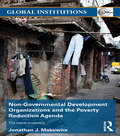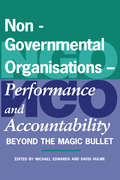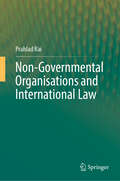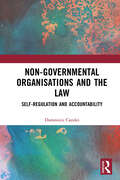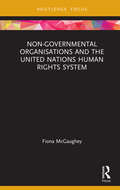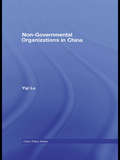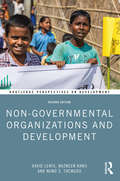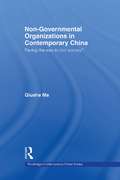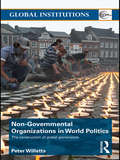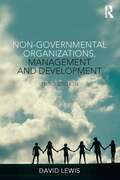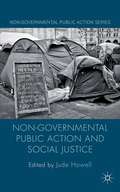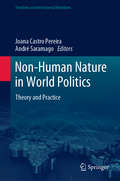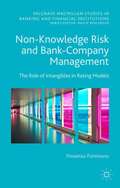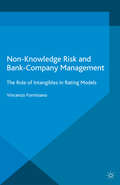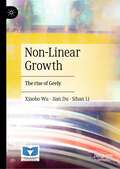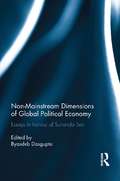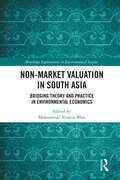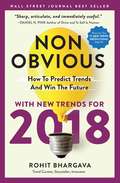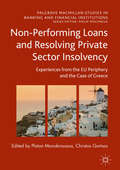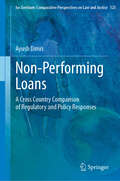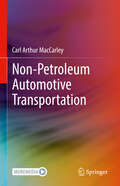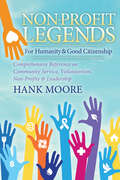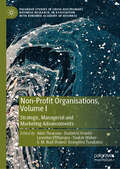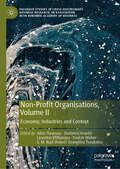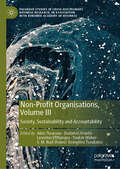- Table View
- List View
Non-Governmental Development Organizations and the Poverty Reduction Agenda: The moral crusaders (Global Institutions)
by Jonathan J. MakuwiraThe Non-Governmental Development Organisations (NGDOs) have, over the past two decades, entered centre stage in their active participation in the social, political and economic issues affecting both the developing and developed world. This book offers a highly stimulating and concise summary of the NGDO sector by examining their history and metamorphosis; their influence on the social, political and economic landscapes of the ‘Northern’ and ‘Southern’ governments and societies. The author analyses competing theoretical and conceptual debates not only regarding their contribution to the global social political dynamism but also on the sector’s changing external influence as they try and mitigate poverty in marginalized communities. This book presents NGDOs as multidimensional actors propelled by the desire to make a lasting change but constrained by market-oriented approaches to development and other factors both internal and external to their environment. While a lot of attention has been given to understanding international NGDOs like World Vision International, Oxfam, Care International and Plan International, this book offers a critical analysis of grassroots organizations – those NGDOs founded and established by locals and operate at the deepest end of the development contexts. This work will be of interest to students and scholars in a range of areas including Development Studies, International Organizations and Globalization.
Non-Governmental Organisations - Performance and Accountability: Beyond the Magic Bullet
by Michael Edwards David HulmeThe last decade has seen some significant changes in international development and in the status of non-governmental organisations operating in the field. Not only has the number of NGOs virtually doubled; many of them have seen a considerable growth in their budgets, and have grown closer to governments and official aid agencies. NGOs are acknowledged by many to be more effective agents of development than governments or commercial interests ? even as a ?magic bullet? for development problems. Despite these positive trends, the real impact of the NGO sector is not well documented. This is partly because NGO performance-assessment and accountability methods are weak, and partly because NGOs are caught up increasingly in the world of official aid, which pushes them towards certain forms of evaluation at the expense of others. This unique book takes a hard and critical look at these issues, and describes how NGOs can, and must, improve the way they measure and account for their performance if they are to be truly effective.
Non-Governmental Organisations and International Law
by Prahlad RaiThis book explores how non-governmental organizations (NGOs), with their sphere of influence within the State and beyond, enrich the international community by working on critical areas affecting people’s lives and expectations, to facilitate a more humanising international law. It provides ideas, highlights issues, and identifies actors, actions, and the scope of NGOs in international law. It charts possibilities and limitations of NGOs within the legal framework of a State and its evolution over the years. The book highlights how NGOs, having obtained 'consultative status' from the UN Economic and Social Council, have now extended their access and area of influence to international actors like inter-governmental organisations, international courts and tribunals. It provides an overview of NGO's performance and the important role they play in the making of human rights, protection of environment and business ethics. The book is primarily doctrinal containing case studies of important NGOs. The purview is an inquiry, analysis and overview of literature of NGOs in international law from a wide range of sources. The book will help shape the debate over power and functions of NGOs in the background of new loci of NGOs’ work. It is useful for students, research scholars, the NGO community, corporations' CSR departments, and concerned governmental agencies. Additionally, being interdisciplinary in nature, it caters to the demands of politics, sociology, management, public policy and social work apart from law.
Non-Governmental Organisations and the Law: Self-Regulation and Accountability
by Domenico CaroleiThis book examines accountability issues and the problems of regulating non-governmental organisations (NGOs) through self-regulation. It focuses on methods of self-regulation for NGOs in response to prominent scandals that revealed problems with their accountability, notably the ‘Mafia Capitale’ scandal in Italy and the Oxfam GB scandal in Haiti. It also touches upon other accountability failures, including the allegations against the WWF of facilitating human rights abuses of indigenous groups in Cameroon. The work brings a legal approach to the topic of NGO self-regulation and accountability, contributing to the academic and policy debate in several ways. It advances a brand-new theoretical model to explain the reasons behind NGOs non-compliance with self-regulation, examines the reasons for self-regulation failures, identifies new accountability routes, and recommends proposals for sectoral reform. The book will be of great interest to scholars, researchers and PhD students who work in the area of NGO regulation and accountability from a legal perspective as well as to accountability and NGO scholars working in other disciplines. It will also appeal to practitioners and policymakers who work on the development of NGO policies.
Non-Governmental Organisations and the United Nations Human Rights System (Routledge Research in Human Rights Law)
by Fiona McGaugheyNon-governmental Organisations (NGOs) have become important, although sometimes overlooked, actors in international human rights law. Although NGOs are not generally provided for in the hard law of treaties, they use the UN human rights system to hold Governments to account. A key way in which they do so is using State reporting mechanisms, initially the UN treaty bodies, but more recently supplemented by the Human Rights Council’s Universal Periodic Review. In doing so, NGOs provide information and contribute to developing recommendations. NGOs also lobby for new treaties, contribute to the drafting of these treaties, and bring individual’s complaints to the UN human rights bodies. This book charts the historical development of the NGO role in the UN. It examines the UN regulation of NGOs but the largely informal nature of the role, and an exploration of the various types of NGOs, including some less benign actors such as GONGOs (Governmental NGOs). It also draws on empirical data to illustrate NGO influence on UN human rights bodies and gives voice to stakeholders both inside and outside the UN. The book concludes that the current UN human rights system is heavily reliant on NGOs and that they play an essential fact-finding role and contribute to global democratisation and governance.
Non-Governmental Organisations in China (China Policy Series)
by Yiyi LuAs Chinese society becomes more open, and hopes rise that control by the Communist Party may become more relaxed, a great deal is expected from non-governmental organisations (NGOs) in the formation of civil society. This book, based on extensive original research including detailed interview research in over 40 Chinese NGOs, discusses the current position of NGOs within China. It argues that although all NGOs – both those originating as a result of government initiatives, and those which are popularly-organised – are dependent on the state, all enjoy a very large degree of autonomy. This autonomy arises in part because of the limited capacity of central government to control NGOs, and in part because of the fragmented and non-monolithic nature of the state, which enables individual bureaucratic patrons to protect particular NGOs, especially officially-organised ones, from the full impact of state control. The book also discusses the skill base of NGOs, showing that this is somewhat limited, and argues that, contrary to current hopes that NGOs and thereby civil society may flourish, the lack of state control is already leading to an "uncivil society" where rules do not exist or are ignored, and where organisations which are supposed to work for the public interest are being used to serve illegitimate private interests instead.
Non-Governmental Organizations and Development (Routledge Perspectives on Development)
by David Lewis Nuno S. Themudo Nazneen KanjiThis book is an introduction to the wide-ranging topic of non-governmental organizations (NGOs) and development, combining a critical overview of the main research literature with a set of up-to-date theoretical and practical insights drawn from experience in Asia, Europe, Africa and elsewhere. The revised second edition highlights the continuing importance of NGOs in development, while fully engaging with the criticisms that their increased profile now attracts. It considers issues such as securitization, changing technologies, and recent concerns about safeguarding as well as going into more detail around topics such as market-based development and social enterprise. The diversity of NGOs and their roles is discussed against the broader historical background of struggles for social justice in different societies, as well as within the shifting ideological contexts of neoliberalism and populism. Using a broad range of short case studies of both successful and unsuccessful interventions, the authors analyze how interest in NGOs has both reflected and informed wider theoretical trends and debates within development studies. The book argues that NGOs are central to both development theory and practice and are likely to remain important actors for many years to come. This critical overview will be useful to students of development studies at undergraduate and master's levels in fields and disciplines as diverse as International Development Studies, International Relations, Geography, Anthropology, Global Studies, Politics and International Studies, as well as general readers and practitioners.
Non-Governmental Organizations in Contemporary China: Paving the Way to Civil Society? (Routledge Contemporary China Series #Vol. 6)
by Qiusha MaBased on documentary materials including interviews with key players in China, this book charts the development of non-governmental and non-profit organizations in China from the late 1970s to the present day. It recounts how in the aftermath of the 1978 reforms that created a market economy and diversified interests and social life, new institutions and organizations outside of the state system increased dramatically in number, size and influence. These organizations, which barely existed before the reforms began in the late 1970s, carry out many social, economic and cultural tasks neglected by the government. Qiusha Ma examines two key questions crucial to understanding the development of NGOs in China: First, is it possible under China’s one-party state for non-governmental organizations to thrive and play important economic, social and political functions? And secondly, are NGOs facilitating the formation of a civil society in China?
Non-Governmental Organizations in World Politics: The Construction of Global Governance (Global Institutions)
by Peter WillettsNon-governmental organizations (NGOs) from Amnesty International and Oxfam to Greenpeace and Save the Children are now key players in global politics. This accessible and informative textbook provides a comprehensive overview of the significant role and increasing participation of NGOs in world politics. Peter Willetts examines the variety of different NGOs, their structure, membership and activities, and their complex relationship with social movements and civil society. He makes us aware that there are many more NGOs exercising influence in the United Nations system than the few famous ones. Conventional thinking is challenged in a radical manner on four questions: the extent of the engagement of NGOs in global policy- making; the status of NGOs within international law; the role of NGOs as crucial pioneers in the creation of the Internet; and the need to integrate NGOs within mainstream international relations theory. This is the definitive guide to this crucial area within international politics and should be required reading for students, NGO activists, and policy-makers.
Non-Governmental Organizations, Management and Development: An Introduction (Routledge Studies In The Management Of Voluntary And Non-profit Organizations Ser.)
by David LewisNon-Governmental Development Organizations have seen turbulent times over the decades; however, recent years have seen them grow to occupy high-profile positions in the fight against poverty. They are now seen as an important element of ‘civil society’, a concept that has been given increasing importance by global policy makers. This book has evolved during the course of that period to be a prime resource for those working (or wishing to work) with and for NGOs. The third edition of Non-Governmental Organizations, Management and Development is fully updated and thoroughly reorganized, covering key issues including, but not limited to, debates on the changing global context of international development and the changing concepts and practices used by NGOs. The interdisciplinary approach employed by David Lewis results in an impressive text that draws upon current research in non-profit management, development management, public management and management theory, exploring the activities, relationships and internal structure of the NGO. This book remains the first and only comprehensive and academically grounded guide to the issues facing international development NGOs as they operate in increasingly complex and challenging conditions around the world. It is the perfect resource for students undertaking studies of NGOs and the non-profit sector, in addition to being an excellent resource for development studies students more generally.
Non-Governmental Public Action and Social Justice
by Jude HowellThis unique collection explores the different organizational forms, strategies and tactics that activists adopt. The authors examine how established trades unions struggle to reform, how non-governmental public actors negotiate various dilemmas, and the efforts of non-governmental public actors to secure justice.
Non-Human Nature in World Politics: Theory and Practice (Frontiers in International Relations)
by André Saramago Joana Castro PereiraThis book explores the interconnections between world politics and non-human nature to overcome the anthropocentric boundaries that characterize the field of international relations. By gathering contributions from various perspectives, ranging from post-humanism and ecological modernization, to new materialism and post-colonialism, it conceptualizes the embeddedness of world politics in non-human nature, and proposes a reorientation of political practice to better address the challenges posed by climate change and the deterioration of the Earth’s ecosystems. The book is divided into two main parts, the first of which addresses new ways of theoretically conceiving the relationship between non-human nature and world politics. In turn, the second presents empirical investigations into specific case studies, including studies on state actors and international organizations and bodies. Given its scope and the new perspectives it shares, this edited volume represents a uniquely valuable contribution to the field.
Non-Knowledge Risk and Bank-Company Management: The Role of Intangibles in Rating Models (Palgrave Macmillan Studies in Banking and Financial Institutions)
by Vincenzo FormisanoIn the current economic scenario, the intangible assets contribute significantly to the construction of the competitive positioning of a company. It follows that this intangible information must be appropriately considered in the internal rating system (IRSs). Currently key aspects of business risk and operational risk such as potential for growth, competitive capabilities, core competencies, role in the supply chain of membership, and governance are being considered as secondary in this system. Intangible factors such as the milieu of the company and the environment in which it operates, are not being appropriately considered. In this book, Vincenzo Formisano proposes new guidelines aimed to set desirable IRSs in which the weight of intangible assets is appropriately and properly valued. He addresses practical rules for achieving a rating system capable of understanding and enhancing the intangible assets of a company and for the assessment of creditworthiness. The first part of the book focuses on existing practices; the second part exposes a general model for the classification and interpretation of intangibles. The third part provides practical guidelines designed to configure desirable rating models in which the weight of intangible assets is correctly considered. This book offers theoretical and practical insights and an easy-to-read approach which provides a valuable source of information for teachers and students in Finance. It is also a useful reference point for the Banking, Accounting and Finance managerial communities.
Non-Knowledge Risk and Bank-Company Management: The Role of Intangibles in Rating Models (Palgrave Macmillan Studies in Banking and Financial Institutions)
by Vincenzo FormisanoIn the current economic scenario, the intangible assets contribute significantly to the construction of the competitive positioning of a company. It follows that this intangible information must be appropriately considered in the internal rating system (IRSs). Currently key aspects of business risk and operational risk such as potential for growth, competitive capabilities, core competencies, role in the supply chain of membership, and governance are being considered as secondary in this system. Intangible factors such as the milieu of the company and the environment in which it operates, are not being appropriately considered. In this book, Vincenzo Formisano proposes new guidelines aimed to set desirable IRSs in which the weight of intangible assets is appropriately and properly valued. He addresses practical rules for achieving a rating system capable of understanding and enhancing the intangible assets of a company and for the assessment of creditworthiness. The first part of the book focuses on existing practices; the second part exposes a general model for the classification and interpretation of intangibles. The third part provides practical guidelines designed to configure desirable rating models in which the weight of intangible assets is correctly considered. This book offers theoretical and practical insights and an easy-to-read approach which provides a valuable source of information for teachers and students in Finance. It is also a useful reference point for the Banking, Accounting and Finance managerial communities.
Non-Linear Growth: The rise of Geely
by Xiaobo Wu Jian Du Sihan LiThis book offers a comprehensive exploration of the transformative trajectory undertaken by Chinese domestic enterprises, with a particular focus on Geely Automobile. Comprising five chapters and totaling 13 sections, the study delves into Geely's remarkable progression from a state of catch-up to surpassing established competitors. The initial chapter chronicles Geely's entry into the automotive industry amidst resource and technological scarcity, shedding light on the strategies employed to achieve breakthroughs during the nascent stages. The subsequent section elucidates Geely's transition from a late entrant to a prominent player in the global automotive market, facilitated by innovative practices across organizational, technological, talent-driven, quality-oriented, and cultural dimensions. The third chapter examines Geely's successful foray into globalization, offering a comprehensive analysis of its non-linear growth trajectory, overseas mergers and acquisitions, and strategic expansion efforts. The fourth part explores Geely's approach to embracing uncertainty and navigating cyclical challenges in the automotive industry, seeking determinative opportunities for future growth. Finally, the concluding chapter draws insights from Geely's non-linear growth and advances the "C theory," an enriched local innovation management framework grounded in China's unique developmental context.
Non-Mainstream Dimensions of Global Political Economy: Essays in Honour of Sunanda Sen
by Byasdeb DasguptaThe book is a collection of essays written by scholars of global repute in honour of Professor Sunanda Sen. Each paper is well-researched and offers some new dimension to the understanding of the current global crisis, finance and labour including the epistemological viewpoints regarding the current global order. The uniqueness of the book is that in one place one can find different heterodox positions dealing with the present global order of finance and labour – post-Keynesian, Marxist etc. The contents of the book can be classified into three major sections – (1) global finance dealing with current global crisis; (2) methodological/epistemological concerns in terms of the global crisis, and (3) labour in the context of neoliberal global capitalism characterised by the process of financialisation. The entire book is an attempt to decipher the meaning and significance the process of financialisation produces for the real economy. One of the major conclusions drawn from the different studies in the book relates to the fact that global finance as it has been shaped today cannot delinked from the question of labour. The current global finance regime warrants neoliberal labour flexibility regime, the latter guaranteeing the necessary surplus generation for the pervasive finance. This book offers an analysis of current global crisis relating it to the present-day global finance and labour in terms of the process of neoliberal financialisation a flexible labour regime. It is based on non-mainstream heterodox approach in Economics and as such is a critique of the mainstream neoclassical position on current global crisis. The contents of the book will be of immense use to the researchers and students dealing with current global crisis, global finance and labour.
Non-Market Valuation in South Asia: Bridging Theory and Practice in Environmental Economics (Routledge Explorations in Environmental Studies)
by Mohammad Younus BhatThis book provides a comprehensive exploration of the challenges and issues concerning the economic valuation of natural resources.The authors present methods and tools that can help in designing policies and frameworks for the sustainable use of natural resources. This is followed by an exploration of the use and non-use values provided by environmental resources, as well as reviewing the current environmental valuation techniques. Furthermore, the authors use meta-analysis to explore a range of South Asia–based case studies, including India and Bangladesh. Using this empirical evidence, they detail the various imperfections, challenges and prospects in the area of management and allocation of environmental resources, conservation of environmental biodiversity and sustainability. This book will serve as a useful reference for academics and analysts in developed and developing countries working in the areas of environmental economics, green economics and sustainable development.It is also intended to encourage practitioners and managers in industry to deepen and expand upon their theoretical and practical understanding of the prevailing challenges associated with enhancing ecosystem services, improved solid waste management and restoring biodiversity of environmental resources.
Non-Obvious: How To Predict Trends And Win The Future
by Rohit BhargavaThe answers to these questions may not be all that obvious. And that's exactly the point. For the past eight years, innovation expert Rohit Bhargava and his team have predicted 15 "Non-Obvious" trends each year. In this book, get a sneak peek at the proven methods exclusively taught to thousands of executives at leading brands, organizations and governments to develop unexpected solutions to critical problems. The power of non-obvious thinking can help you see what others miss, grow your business and make a bigger impact in the world. <p><p> In this all-new eighth edition, discover what more than a million readers already have: how to use the power of non-obvious thinking to grow your business and make a bigger impact in the world. <p> In total, the Non-Obvious 2018 Edition features 15 all-new trends across 5 categories including Culture & Consumer Behavior, Marketing & Social Media, Media & Education, Technology & Design plus Economics & Entrepreneurship. The book also features a detailed section with a review and rating for more than 100 previously predicted trends - with longevity ratings for each. <p> As with the original version, this new edition of Non-Obvious also delves into the curation process the author has used for years to build his Trend Reports and takes readers behind the scenes of trend curation (much to the delight of past readers who have been asking about this for years), and show them the methodology they can use to predict the future for themselves.
Non-Performing Loans and Resolving Private Sector Insolvency
by Platon Monokroussos Christos GortsosThis book explores the issue of private sector over-indebtedness following the recent financial crisis. It addresses the various challenges for policymakers, investors and economic agents affected by applied remedial policies as the private non-financial sector in Europe continues to face increased challenges in servicing its debt, with the problem mainly concentrated in several countries in the EU periphery and Eastern Europe. Chapters from expert contributors address reduced investment as firms concentrate on deleveraging and repairing their balance sheets, curtailed consumer spending, depressed collateral values and weak credit creation. They examine effective policies to facilitate private sector debt restructuring which may involve significant upfront costs in terms of time to implement and committed budgetary resources, as well as necessary reforms required to improve the broader institutional framework and judicial capacity. The book also explores the issue of over indebtedness in the household sector, contributing to the literature in establishing best practice principles for household debt.
Non-Performing Loans: A Cross Country Comparison of Regulatory and Policy Responses (Ius Gentium: Comparative Perspectives on Law and Justice #125)
by Ayush DimriThis book focuses on the regulatory, supervisory and policy resolutions of the problems of the financial and banking system during the global financial crisis and the COVID-19 pandemic. Many banks around the globe failed due to a bubble in the real estate sector, which was created in the US and rapidly spread around the world, producing a massive liquidity crunch. As a result, the proportion of non-performing loans (NPLs) rose in developed and emerging nations alike. This book critically examines the impact of the macroeconomic and microeconomic determinants that positively and negatively impact NPLs. The book offers a comparative analysis of initiatives taken in the UK, India, and Ireland. It examines the regulatory, supervisory, and policy-related measures adopted by these jurisdictions at the macro and micro levels, concluding that these measures alone will not suffice to reduce the proportion of NPLs due to the ever-evolving nature of the financial sector, mainly due to the excessive use of new technology that led to the evolution of new payment methods in the banking business in the recent time. It also shows how these jurisdictions mitigated various issues that emerged due to the COVID-19 pandemic and proposes corresponding measures, which mainly focus on applying new policy and regulatory interventions and structural changes in the institutional framework to address the problem of NPLs more effectively and avoid future downturns.
Non-Petroleum Automotive Transportation
by Carl Arthur MacCarleyNon-Petroleum Automotive Transportation addresses the broad topic of energy and environmental sustainability for automotive transportation in a balanced, comprehensive, and readable way. Readers will gain a basic understanding of the characteristics, advantages, and limitations of all viable alternatives to fossil fuels, as well as the basics of internal combustion engines. Fuels include ethanol, methanol, hydrogen, biodiesel, biomethane, natural gas, ammonia, dimethyl ether, and synthetic e-Fuels, and methods to calculate the carbon emissions and power output limits for each are covered. The technologies, operation, efficiency, and overall emissions of battery electric, hybrid electric, and hydrogen fuel cell vehicles will be analyzed and compared with all other vehicle fueling options. Also covered are the fueling and charging infrastructure challenges, energy resource requirements, indirect environmental impacts, safety, and economic ramifications of the transition from gasoline and diesel fuel to electric and renewable fuels. The interdependence of transportation with solar, wind, electric energy storage, and emerging renewable energy sources is discussed. The book concludes with an overview of the effect of incentives and carbon credits on the direction of automotive energy and suggestions for future career and investment opportunities enabled by this revolution.
Non-Profit Legends for Humanity & Good Citizenship: Comprehensive Reference on Community Service, Volunteerism, Non-Profits & Leadership
by Hank MooreNon-Profit Legends is a comprehensive overview book on serving communities and motivating leadership for non-profits. Author Hank Moore has worked with and advised hundreds of non-profit organizations, including charities, educational institutions, public sector entities, associations, and corporate citizenship programs. In Non-Profit Legends Hank uses his experience and teaches readers to embrace the past, with direct relationship to the future. Inside you will find extensive information about history, cultural enlightenment and community leadership knowledge, all rolled in one, plus a dynamic panorama of humanitarian contributions to society. Hank Moore is the highest level of business overview expert and is in that rarified circle of visionaries such as Peter Drucker, Stephen Covey and W. Edwards Deming. The Business Tree™ is his trademarked approach to growing, strengthening and evolving business, while mastering change. He advises companies about growth strategies, visioning, planning, leadership, futurism and Big Picture issues. He has written a series of business books. This is the third book in his Legends series, paralleling pop culture, history and innovative strategies. He has won lifetime achievement awards for leadership. Hank Moore’s Legends books embrace history, cultural phenomena and strategies for success.
Non-Profit Organisations, Volume I: Strategic, Managerial and Marketing Advancements (Palgrave Studies in Cross-disciplinary Business Research, In Association with EuroMed Academy of Business)
by Leonidas Efthymiou Demetris Vrontis Yaakov Weber Alkis Thrassou Evangelos Tsoukatos S. M. Riad ShamsThis four-volume book examines, through multiple and cross-discipline perspectives, the science and practice of not-for-profit organisations. These organisations have drawn considerable attention and witnessed extensive growth as they engage in delivering public services to society. And are increasingly pressured to balance business with social goals, inherent idiosyncratic features with management creativity, structural limitations with operational flexibility, and ethical boundaries with pragmatism; all with scarce resources but abundant determination. The first volume explores the opportunities and challenges of non-profit organisations in the contemporary environment, elucidating current and future issues in the field, setting strategic directions, and presenting sector-wide examples and best practices. The second volume explores contextual aspects relating to the economy and industries. The third volume presents social and ethical aspects, as well as matters of sustainability, accountability and the overall wellbeing of society. The fourth and final volume examines structures and models, with an emphasis on technology.
Non-Profit Organisations, Volume II: Economy, Industries and Context (Palgrave Studies in Cross-disciplinary Business Research, In Association with EuroMed Academy of Business)
by Leonidas Efthymiou Demetris Vrontis Yaakov Weber Alkis Thrassou Evangelos Tsoukatos S. M. Riad ShamsThis four-volume book examines, through multiple and cross-discipline perspectives, the science and practice of not-for-profit organisations. These organisations have drawn considerable attention and witnessed extensive growth as they engage in delivering public services to society. And are increasingly pressured to balance business with social goals, inherent idiosyncratic features with management creativity, structural limitations with operational flexibility, and ethical boundaries with pragmatism; all with scarce resources but abundant determination. The first volume explores the opportunities and challenges of non-profit organisations in the contemporary environment, elucidating current and future issues in the field, setting strategic directions, and presenting sector-wide examples and best practices. The second volume explores contextual aspects relating to the economy and industries. The third volume presents social and ethical aspects, as well as matters of sustainability, accountability and the overall wellbeing of society. The fourth and final volume examines structures and models, with an emphasis on technology.
Non-Profit Organisations, Volume III: Society, Sustainability and Accountability (Palgrave Studies in Cross-disciplinary Business Research, In Association with EuroMed Academy of Business)
by Leonidas Efthymiou Demetris Vrontis Yaakov Weber Alkis Thrassou Evangelos Tsoukatos S. M. Riad ShamsThis four-volume book examines, through multiple and cross-discipline perspectives, the science and practice of not-for-profit organisations. These organisations have drawn considerable attention and witnessed extensive growth as they engage in delivering public services to society. And are increasingly pressured to balance business with social goals, inherent idiosyncratic features with management creativity, structural limitations with operational flexibility, and ethical boundaries with pragmatism; all with scarce resources but abundant determination. The first volume explores the opportunities and challenges of non-profit organisations in the contemporary environment, elucidating current and future issues in the field, setting strategic directions, and presenting sector-wide examples and best practices. The second volume explores contextual aspects relating to the economy and industries. The third volume presents social and ethical aspects, as well as matters of sustainability, accountability and the overall wellbeing of society. The fourth and final volume examines structures and models, with an emphasis on technology.
